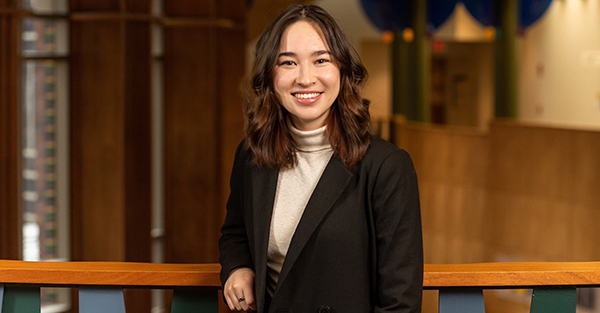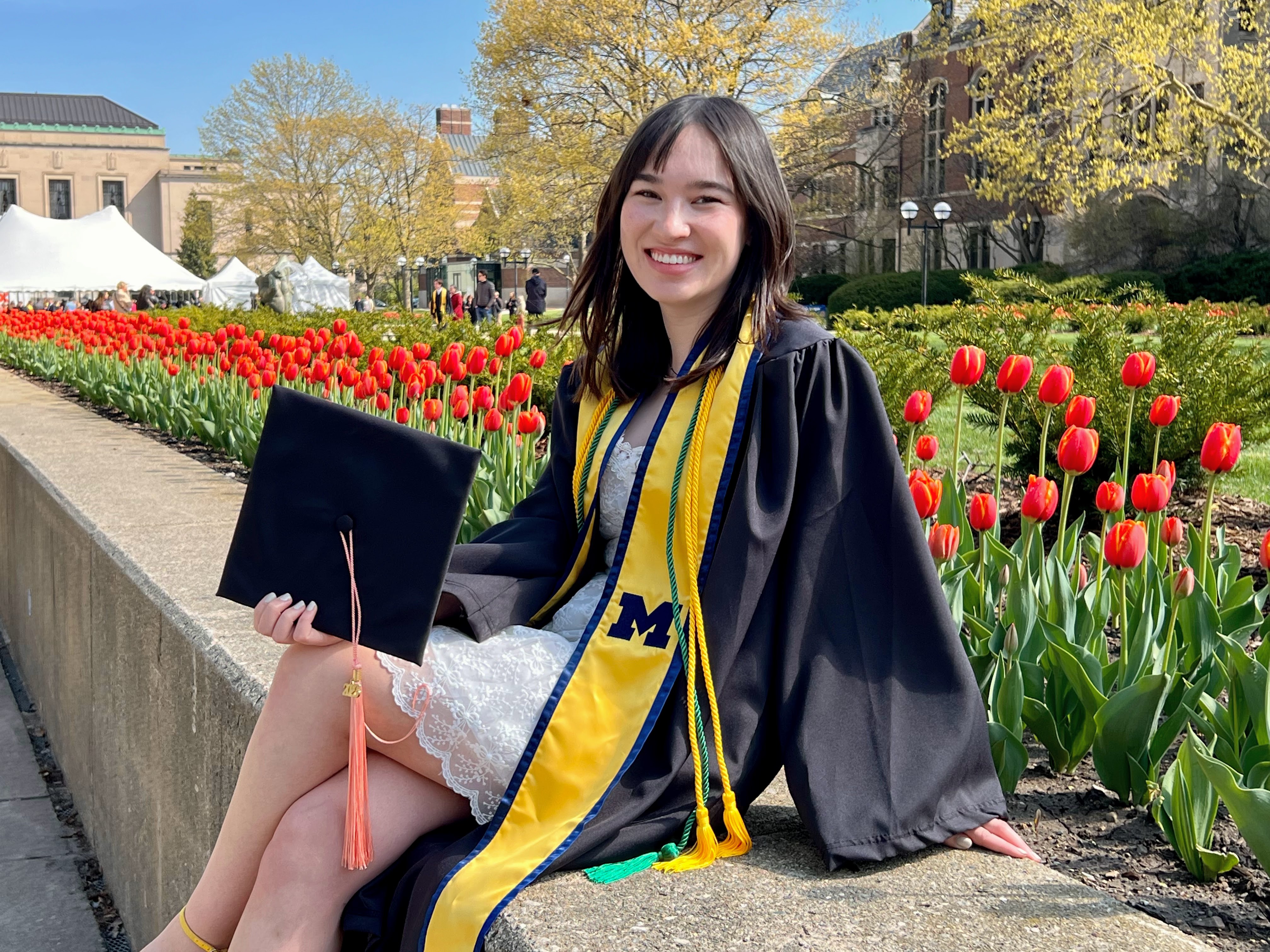Alumna focuses on environmental side of public health

Elisabeth Repp, BA ’23
Community and Global Public Health
To an average kid growing up in Michigan, water might seem abundant—they don’t call it the Great Lakes State for nothing. Only about 3 percent of the Earth’s water is fresh, however, and only about 1 percent can be used as drinking water.
If you’re an inquisitive 12-year-old growing up 70 miles south of Flint during one of the country’s worst water crises on record—like Elisabeth Repp, BA ’23 was at the time—it would be natural to question what a lot of people take for granted.
“The Flint water crisis was a very formative part of my childhood,” said Elisabeth Repp, who earned a Bachelor of Arts in Community and Global Public Health in 2023 from the University of Michigan School of Public Health. “Growing up in Michigan, with the Great Lakes and access to fresh water, I was confused. How does this happen in this town in Michigan, which has access to the same clean water I have?
“It wasn’t necessarily affecting me and my community, but I recognized the environmental injustice. It started getting the wheels turning and I’ve been passionate about this topic ever since.”
Growing up in Michigan, with the Great Lakes and access to fresh water, I was confused. How does this happen in this town in Michigan, which has access to the same clean water I have? It wasn’t necessarily affecting me and my community, but I recognized the environmental injustice.”
The Flint water crisis began in June 2013, when it was decided to switch Flint’s water supply to the Flint River as a cost-cutting measure. When the switch was officially made in April 2014, the river water was not properly treated to guard against corrosion. This allowed lead and other contaminants to leach into residents’ water.
“As I got older and understood that this wasn’t a one-off case, anger and frustration grew,” said Repp, who considers the Great Lakes not only a resource but also a sacred natural space. “I think being from the Great Lakes area is kind of a unique situation. As you’re growing up, you’re given the opportunity to see the lakes and understand the water system. Some adults don’t know where their water comes from and where their watershed is, but I didn’t have that disconnect.”
There was a time in high school when Repp considered pursuing a path in medicine, but she chose public health because of its potential for impact.
“If people are struggling with the same issues and they could be traced to a root cause, I know I can help more people through public health,” she said. “Specifically with the environmental health part of public health, it allows me to affect health on a larger scale.”
The Bachelor of Arts in Community and Global Public Health degree offered the community-based approach to public health that Repp was looking for, but she was also drawn to the degree’s emphasis on communications.
“I appreciate the hard science of public health [which is the focus of the school's BS program], but I think it’s important to be able to communicate that information directly to the people affected by these issues,” she said. “Because I thought about being a doctor, that person-to-person aspect of helping people is still very important to me.”
Repp started her University of Michigan journey in the College of Literature, Sciences, and the Arts and transferred to the School of Public Health her junior year.
“My time at the University of Michigan was some of the best times of my life and I’m really happy that I did the public health program,” she said. “I met so many amazing people there; some of the most interesting and compassionate people that I’ve met are associated with the program. It was truly an amazing experience.”
Her activities at the university included serving as a research assistant for the Michigan Youth Violence Prevention Center and interning for the University of Michigan School of Information. As a research assistant, Repp worked on a pilot study to test low-cost interventions that could be implemented on sites that had historically been dumped on illegally. These experiences expanded and deepened her interests in public health.
“Water is definitely my biggest interest, but I’m also interested in food and sustainability,” she said. “With climate change, and all those impending crises, developing our food systems to be sustainable and meet everyone’s needs is going to be a challenge.”
Once again, Repp is finding a connection with the Great Lakes.
Water is definitely my biggest interest, but I’m also interested in food and sustainability. With climate change, and all those impending crises, developing our food systems to be sustainable and meet everyone’s needs is going to be a challenge.”
Repp is currently a Master of Health Science student at the Johns Hopkins Bloomberg School of Public Health. As part of the year-long program, she will be looking at lead in schools’ drinking water and the environmental justice implications of how to go about removing lead.
“My bachelor’s degree did a really good job of giving me a breadth of knowledge and instruction on how to think like a public health practitioner,” she said. “I wanted to pursue a master’s degree because I thought it would give me more specialized knowledge. I can now dive deeper into environmental health, risk sciences and toxicology before entering the public health practice world.”
Repp is learning more about risk assessment and communications and would like to get experience working with a regulatory agency in the Baltimore or Washington, D.C., area after receiving her master’s degree.
“I would also like to move back to the Great Lakes region eventually,” she said. “Being away shows me how much I love it.”

